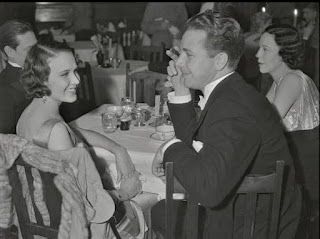Friday, February 02, 2024
Glamour and Heartbreak in the Golden Age
Wednesday, January 31, 2024
June Allyson (Truth without Consequences)
June Allyson: Maybe it just shows more now, but I’ve always been June Allyson, girl-individual. Even though Richard plays the boss, I make my own decisions about most things. I played in The Shrike, even though Richard was against it.
Q: Do you think you can be a real wife and a real help to your husband without sacrificing your independence?
June: Absolutely. I lead my own life, but here I am like a hen hovering over my brood. So of course, I think independence and family life can go together.
Q: How about the eternally ticklish problem of separate interests?
Q: Who are your best friends?
June: Pam and Ricky. I feel if you can’t be friends with your kids, what good is anything? Oh, I’m strict with them. But I’m strict only because I want them to be liked. Many times I’ll chastise one of them and then go to my room and cry. But sometimes it’s got to be done. Like one time when Ricky was planning to have lunch with the carpenter who works for us. It’s a big treat for him. But he was a bad boy that morning and I had to forbid him to go. Well, he sobbed and sobbed. It took all the strength I have to stop myself from wiping the tears from his eyes and sending him off to his lunch treat. But I didn’t. And the next day—well, it would make a better story to tell you he was bad the next day. But he was as good as gold. And he even forgave me.
Q: How about you, June? Are you sentimental?June: Are you kidding? Everything makes me melt. I’m soft-hearted Sally, a sitting duck. Richard claims that I cry at the commercials on television. But that hasn’t been proved yet. Richard is sentimental too. But you’ll never get him to admit it.
Q: Do you think marriage to Dick has changed you in any important ways?
June: Yes. In at least one very important way. I’m not so selfish any more. In marriage you’ve just got to think of the other person. You give up things that you wanted very much, by adjusting to your husband. And then, suddenly, you find you didn’t really want those things at all. What you really want is a happy marriage. Last Monday was our anniversary and Richard gave me my heart’s desire: a big, large, gigantic, new refrigerator!
Q: That’s a nice small dream to have come true. Have you had any big dreams come true lately?
June: When I was a little girl I wanted more than anything else to be—not a nurse, like most girls, but a doctor. But we never had enough money. And, do you know what? My brother lives with us now, in a cottage near the house and he’s going to medical school. So, in a way, it’s my old dream coming true. Not for me, but for my brother.
Q: Is there a big dream hidden away somewhere right now?
Q: What was the most awful day of your life?
June: Hmmm. I won’t say it was the most awful, but the day I have in mind was the saddest. It was Christmas Eve and I had just gotten a job in a Broadway show. And on Christmas, I lost the job. I went down to the bus stop the next day and saw the company off with real tears in my eyes. It was like an unhappy ending to a fairy tale. It was even snowing as I waved good-bye to the company.
Q: Doesn’t that make Christmas a pretty sad memory?
Q: June, have you ever lost hope completely? Ever given in to despair?
June: There was one time. When Richard almost died. He was in the bedroom with me when he suddenly collapsed on the floor with a burst appendix. Somehow I’ll never know how, I managed to drag him to the bed and call the doctor. I lost twenty pounds in the first four days he was in the hospital. They’d given him up for dead. I stayed there day and night until finally one of the Sisters at the hospital sent me home to change my clothes. As soon as I got to the house the phone rang. It was the hospital. I was to come back right away. They’d given Richard the last rites. I tell you, I didn’t cry any more, or pray any more. I was drained of everything. There was nothing left inside of me. Four weeks later, thanks to God and Dick’s own good strength, they brought him home almost well. Then I cried, finally, and prayed in gratitude.
Q: People have said you’re a very temperamental star. Is that true?
Q: How about the fact that some people (probably the same ones) have said that youre a—dare we repeat it?—scatterbrain?
Q: Do you have an ideal image of the kind of woman you admire, would want to be like?
June: My ideal has always been Ginger Rogers. And Ginger is now my very good friend.
Q: What do you think is a woman’s greatest need?
June: (WITH A BROAD GRIN) A great big large, gigantic, new. . . refrigerator.
Q: Every public figure, especially a movie star, is often the center of a lot of conjecture . . . some true, some false. What do you most wish people would stop thinking, saying and writing about you?

.jpg)










.jpeg)













.jpg)













.jpg)





.jpg)















